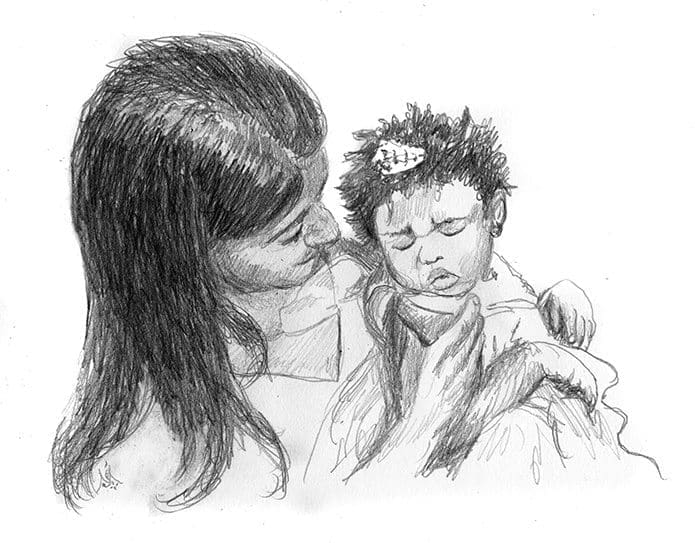
The least of these may be the greatest among us
By LORRAINE V. MURRAY, Commentary | Published December 23, 2014
She was a tiny baby when I first met her. She was the fourth child adopted into the family, which also consisted of two older girls and one boy. I met her mother when I was attending a home Mass for a friend facing heart surgery the next day.
Someone there told me the mother kept this baby wrapped in her arms constantly. That may not be unusual, but the baby certainly was. You see, this little one had been born with part of her brain missing. She was blind and she had to be fed through tubes.
When I found out about the baby’s disabilities—which will require special care for the rest of her life—I thought the family was carrying a huge cross. But as the years went on, I changed my point of view.
She is now 8 years old. She is in a wheelchair, and the family positions her in front of the altar at Sunday Mass. She is always dressed beautifully in colorful, crisp dresses with ribbons in her hair, glittery shoes, and frilly socks. She still cannot see or speak, and she is still fed in a special way.
But as I’ve come to know the family better, I’ve realized that what appear as hardships may become over time great blessings.
Everyone at church makes a fuss over this little girl, whose name is Anastasia, but whose nickname is Queenie. How fitting, since she is the queen of this family’s hearts—and their home.
Those who don’t believe in God might have made the decision—before the child’s birth—to abort her. They would have talked about sparing her suffering. They would have suggested she would bring nothing to the world. Her care would be expensive and time-consuming.
What people like this often mean is they want less suffering themselves. They don’t want to be the ones caring for her. They don’t want to be faced with the years of attention she will require.
They are overlooking the fact that even children who can’t see, can’t walk, can’t talk, can’t read, can’t do addition and subtraction, can’t pick up a fork and a spoon—still bring something glorious and priceless to the world.
I remember years ago when I was with another friend and we saw Queenie across the room in her wheelchair. “There goes a saint,” my friend said. And I corrected her, “I’d say the parents are the saints.”
But now I see what my friend meant. The little girl is incapable of sinning. She is as innocent today as on the day she was born. She is fully trusting of her family, her teachers, her community to pray for her, to care for her, to love her.
She may never leave the realm of childhood. But we know that Christ told us “Unless you change and become like little children, you will never enter the kingdom of heaven.”
So despite what the secular world might see—a little girl with multiple disabilities—in God’s eyes she is someone quite different.
She is someone with a mission, which is to turn hearts of stone into flesh. She is a reminder that the kingdom of heaven is through the narrow path. And that the least among us, the smallest and the weakest, will show the rest of us the way.
Artwork by Jef Murray. The Murrays attend St. Thomas More Church in Decatur. Their email address is lorrainevmurray@yahoo.com.